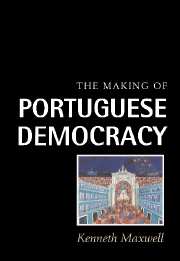Book contents
8 - The revolution tamed
Published online by Cambridge University Press: 24 November 2009
Summary
The classical case of wooing the mother in order to marry the daughter, and the daughter is Angola.
Admiral Rosa Coutinho (November 1975)Let us put aside for one moment the ideologies which inspire us and humbly note the fact that whereas nearly all the people were with our revolution, today we have to recognize that this is not the case. The march of the Revolution has gained a pace which the people have not the capacity to absorb.
General Costa Gomes to the Armed Forces Movement Assembly (July 1975)General Vasco Gonçalves wants us to believe that the dilemma before us in Portugal is “revolution or counterrevolution” … we refuse this false and simplistic dilemma [which] deforms Portuguese reality.
Mário Soares (August 1975)The scale of outside intervention in Angola remained largely hidden from public view until December 12, 1975 when a story by David Binder on the New York Times front page revealed the full extent of US clandestine involvement. Most public attention over the summer and autumn of 1975 remained focused on Portugal. The land seizures in the south, and some highly publicized but isolated seizures elsewhere in the country thoroughly alarmed small landowners and scared them into mutual political action and collaboration in August 1975. Often encouraged by local priests, mobs burned and sacked at least forty-nine of the Communist Party's offices in central and northern Portugal, virtually expelling the Communist Party from these regions.
- Type
- Chapter
- Information
- The Making of Portuguese Democracy , pp. 147 - 167Publisher: Cambridge University PressPrint publication year: 1995

